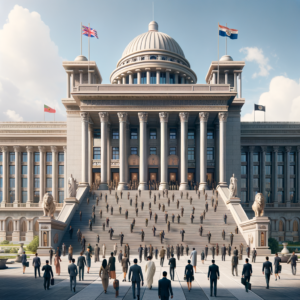Groundbreaking Supreme Court Ruling: A Shift in Legal Precedents
[caption id="attachment_71146" align="alignnone" width="1102"] Congress[/caption]
The United States Supreme Court has once again captured national attention with a groundbreaking ruling that promises to reshape legal landscapes across the country. This decision, which emerged from a contentious case involving civil rights and individual liberties, has sparked debate among legal scholars, practitioners, and the public alike. As the implications of this ruling unfold, it is crucial to examine its context, details, and potential long-term effects on American law and society.
Understanding the Context: The Significance of the Supreme Court's Recent Ruling
The recent ruling by the Supreme Court marks a pivotal moment in American jurisprudence, particularly in the realm of civil rights. The case, which centered on the balance between individual freedoms and governmental authority, reflects ongoing societal debates about personal liberties in the face of legislative and judicial constraints. As the nation grapples with issues such as privacy, discrimination, and freedom of expression, the Court's decision serves as a critical touchstone for understanding how these rights will be interpreted and enforced in the future. This ruling not only addresses the specific legal questions at hand but also signals a broader commitment to uphold constitutional protections in an increasingly complex legal environment.
Key Details of the Ruling: What the Court Decided and Its Immediate Implications
In a narrow 5-4 decision, the Supreme Court ruled that certain state laws infringing on individual rights are unconstitutional, thereby reinforcing the principle of personal liberty. The majority opinion, authored by Justice Elena Kagan, emphasized the need for a robust interpretation of the Constitution that protects citizens from overreach by state authorities. The immediate implications of this ruling are profound; it invalidates several state laws that had previously restricted individual rights, setting a precedent that could lead to further challenges against similar legislation across the country. The ruling has prompted immediate reactions from various stakeholders, including state lawmakers who may now need to reconsider existing statutes in light of this new legal framework.
Analyzing the Legal Precedents: How This Ruling Challenges Established Norms
This ruling challenges established legal norms by revisiting and redefining key precedents that have long governed the relationship between individual rights and state powers. Historically, the Court has often upheld state laws that limited personal freedoms under the guise of public interest or safety. However, this recent decision signals a departure from that trend, suggesting a more protective stance towards individual liberties. Legal experts note that the ruling could potentially overturn decades of jurisprudence that allowed for the erosion of civil rights in the name of regulation. By prioritizing constitutional protections over state interests, the Court has opened the door for a reevaluation of numerous laws that may have previously been deemed acceptable.
Reactions from Legal Experts: Diverse Perspectives on the Court's Decision
The Supreme Court's ruling has elicited a wide range of reactions from legal experts and scholars. Some view the decision as a landmark victory for civil rights advocates, heralding a new era of judicial protection for individual liberties. They argue that the ruling reinforces the fundamental principles of democracy and justice, ensuring that citizens are shielded from arbitrary governmental actions. Conversely, critics of the decision express concern that it may lead to judicial overreach, arguing that such matters should be left to the legislative process rather than being dictated by the judiciary. This divide among legal experts underscores the complexity of the issues at stake and the potential ramifications of the Court's decision on future legal interpretations.
Potential Long-Term Effects: What This Ruling Means for Future Legal Cases
The long-term effects of this ruling are likely to be significant, as it sets a new standard for evaluating laws that impact individual rights. Legal analysts predict that this decision will embolden individuals and advocacy groups to challenge existing and future legislation that they perceive as infringing upon their freedoms. Furthermore, the ruling may inspire a wave of litigation aimed at revisiting other contentious legal precedents, particularly those related to civil rights, privacy, and freedom of expression. As lower courts begin to interpret this ruling, it is expected to influence a variety of cases, potentially reshaping the legal landscape in ways that reflect a more expansive view of personal liberties.
Conclusion: The Broader Impact of the Ruling on American Law and Society
The Supreme Court's recent ruling represents a significant shift in the legal framework governing individual rights in the United States. By prioritizing constitutional protections and challenging established norms, the Court has not only altered the immediate legal landscape but has also set the stage for ongoing debates about the balance between state authority and personal freedoms. As society continues to evolve, this ruling will likely serve as a reference point for future legal battles and discussions surrounding civil rights. Ultimately, the broader impact of this decision will resonate beyond the courtroom, influencing public discourse and shaping the future of American democracy.
As the implications of this ruling unfold, it is essential for citizens, lawmakers, and legal practitioners to engage in thoughtful dialogue about its significance and potential consequences. The Supreme Court's decision serves as a reminder of the vital role that the judiciary plays in safeguarding individual liberties and upholding the principles upon which the nation was founded.
